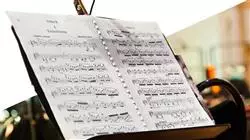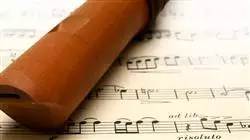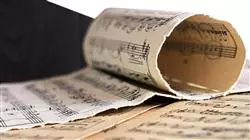University certificate
The world's largest faculty of humanities”
Description
If you are looking for a program to specialize in instrumentation and Orchestration, this postgraduate diploma is perfect for you. Are you going to pass up the opportunity to take it 100% online?"

Orchestration as a field goes beyond the study and practice of writing music for any ensemble. It is also in charge of adapting the works to the different genres, as well as to the instruments that compose the group that will perform them. Therefore, through the mastering of the most sophisticated harmonic techniques, the composer contributes to cultural creation through the creative and specialized interpretation of classical and modern pieces. However, this is a field that requires an exhaustive handling of the main techniques, as well as an intensive knowledge of the characteristics of the different types of orchestras and their components.
For this reason, TECH and its team versed in musicology and musical direction have developed this complete and extensive program in Orchestration, an innovative and multidisciplinary degree through which graduates will be able to handle the necessary information to master instrumentation and musical notation in just 6 months of multidisciplinary training. In addition, the student will work conscientiously in the acquisition of the necessary competencies to carry out an effective orchestral conducting, based on the different styles that exist today and the interpretative resources of each one of them.
To that end, we offer 600 hours of the best theoretical, practical and additional content, which will be presented in a convenient and accessible 100% online format. In this way, the professional will be able to access the program's course whenever they want and need it, without having to worry about tight schedules or on-site classes. The virtual campus, where all the content is hosted, is compatible with any device with Internet connection, so you can access it from anywhere you want through a cell phone, a PC or a Tablet.
You will work on enhancing your skills related to musical notation and conducting through 600 hours of the best theoretical, practical and additional content"
This postgraduate diploma in Orchestration contains the most complete and up-to-date program on the market. The most important features include:
- The development of case studies presented by experts in musical conducting
- The graphic, schematic and practical contents of the book provide technical and practical information on those disciplines that are essential for professional practice
- Practical exercises where self-assessment can be used to improve learning
- Its special emphasis on innovative methodologies
- Theoretical lessons, questions to the expert, debate forums on controversial topics, and individual reflection assignments
- Content that is accessible from any fixed or portable device with an Internet connection
You will delve into the intricacies of the orchestra, from the instruments that compose it to the characteristics of chamber formation according to the acoustics of the venue"
Its teaching staff includes professionals from the sector who bring their work experience to this program, in addition to recognized specialists from leading societies and universities.
The multimedia content, developed with the latest educational technology, will provide the professional with situated and contextual learning, i.e., a simulated environment that will provide immersive education programmed to learn in real situations.
This program is designed around Problem-Based Learning, whereby the professional must try to solve the different professional practice situations that arise during the academic year. This will be done with the help of an innovative system of interactive videos made by renowned experts.
You will acquire specialized knowledge about the characteristics of the different instruments: percussion, string and wind (and their modalities)"

You will have unlimited access to the Virtual Campus, without timetables or on-site classes and through any device with Internet connection"
Objectives
This postgraduate diploma has designed so that students can access the most cutting-edge theoretical, practical and supplementary content that will allow them gain expertise, in just 6 months, in Orchestration and its many possibilities. Thanks to the highly demanding curriculum, any professional will be able to achieve even their highest goals through a program that is tailored to their needs and presented in a convenient and accessible 100% online format.

The most significant characteristics of this postgraduate diploma include the special emphasis it puts on the classification of voices for the vocal repertoire"
General Objectives
- Know the characteristics and sound possibilities of the instrument
- Adopt an adequate position of the body with respect to the instrument, which makes possible and favors the action of the arm-forearm-hand set on the keyboard
- Enable the student to combine the different orchestral instruments in a reduced format
- Know the organization and functioning of all the chords used during the period of tonal harmony practice
- Apply tuning procedures and techniques for one of the three strings of the central A of the piano based on intervention plans with quality and safety criteria
Specific Objectives
Module 1. Instrumentation and Orchestration
- Know the technical and idiomatic characteristics of the instruments integrate a symphony orchestra
- Distinguish aurally the different musical instruments, both individually and collectively
- Analyze the instrumentation of specific passages
- Acquire identification skills in terms of musical period and genre
Module 2. Vocal-Orchestral Repertoire
- Know the technical and idiomatic characteristics of the types of choir integrated with a symphony orchestra
- Distinguish aurally the types of voices in conjunction with the orchestra
- Distinguish the musical genre and period aurally
- Analyze the vocal part of particular passages
Module 3. Musical Notation
- Apply correctly the criteria and methods of critical edition in the musicological field and the paleographic techniques of transcription of instrumental music, from the Middle Ages to the present day
- Know the basic principles of vocal musical notation from the Middle Ages to the Baroque according to the criteria of scientific transcription
- Know the manuscripts and sources of music through the historical course
Module 4. Orchestra Conducting
- Delving into the knowledge of the different styles and the interpretative resources of each one of them
- Develop criteria on aesthetic issues through work
- Master the tuning criteria of each instrument
- Apply polyphonic listening and listen simultaneously to all the parts that integrate the orchestra

You will have access to the most cutting-edge and exhaustive material related to the different types of contemporary operas and their main representatives"
Postgraduate Diploma in Orchestration
Orchestration is an art that encompasses many aspects of musical composition, from the mastery of harmonic techniques to the adaptability of works to different instruments and genres. For this reason, TECH has developed the Postgraduate Diploma in Orchestration, a new, multidisciplinary program that will allow you to address issues such as instrumentation, musical notation, vocal-orchestral repertoire, and orchestral conducting styles and resources. All this in a 100% online format, with which you can access the program whenever you want, from any place and device with an Internet connection, without having to worry about schedules or on-site classes.
Orient your professional profile towards Orchestration with this 100% online program
Through the Postgraduate Diploma in Orchestration, you will learn to adapt the works to the different genres and instruments that make up the group that will perform them, and contribute to cultural creation through creative and specialized interpretation of classical and modern themes. In addition, you will work on acquiring the necessary skills to carry out effective orchestral conducting, based on the different styles that exist today and the interpretative resources of each one of them.







